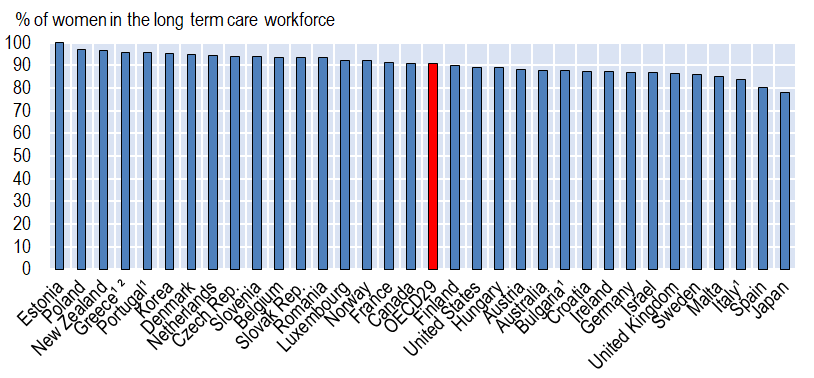Women are well-represented in health and long-term care professions, but often in jobs with poor working conditions
March 2019 - Women make up the majority of the overall health and social workforce: across the OECD around 3/4 of people working in health and social care are women, i.e. 20 million women compared with 6.3 million men. But, women working in the health and social care sector are often in lower-paid jobs. For example, the share of women doctors has increased steadily over the past decades across OECD countries, from about 30% of all doctors in 1990, to about 40% by 2000 and up to 47% in 2015. However, women doctors tend to earn less because they are under-represented in the most highly paid specialisations like surgery: e.g., female doctors in the United States were paid nearly USD 20,000 a year less than their male colleagues, even after accounting for factors such as age and years of experience (Jena et al, 2016).
Women even more heavily dominate the long-term care (LTC) sector: on average, women hold about 90% of the jobs in the LTC-sector (Figure 1). Working conditions in this sector tend to be relatively poor. For example, in 2014, across nine EU countries, 50% of LTC workers received EUR 8 per hour, compared to EUR 12 for 50% of hospital workers. Furthermore, the working conditions of LTC-workers are often difficult and demanding, both physically and mentally. One in six LTC workers across EU countries report that they suffer from at least one health problem that was caused or amplified by their work.
Figure 1. Women represent the overwhelming majority of LTC workers in all countries
Share of women in the long-term care workforce, 2016 or nearest year)
Download underlying data (XLSx)
Women are also more likely to provide informal care than men are. On average, across the OECD, 60% of informal carers over 50 are women. Informal carers providing many hours of care per week are less likely to engage in work, and more likely to suffer from mental health problems (e.g. depression), with women disproportionally affected. If informal carers have a job, it is also more likely that it is part-time. In most countries, caregiving is associated with a higher probability of experiencing poverty.
More data on the OECD Gender Data Portal
Related Documents


